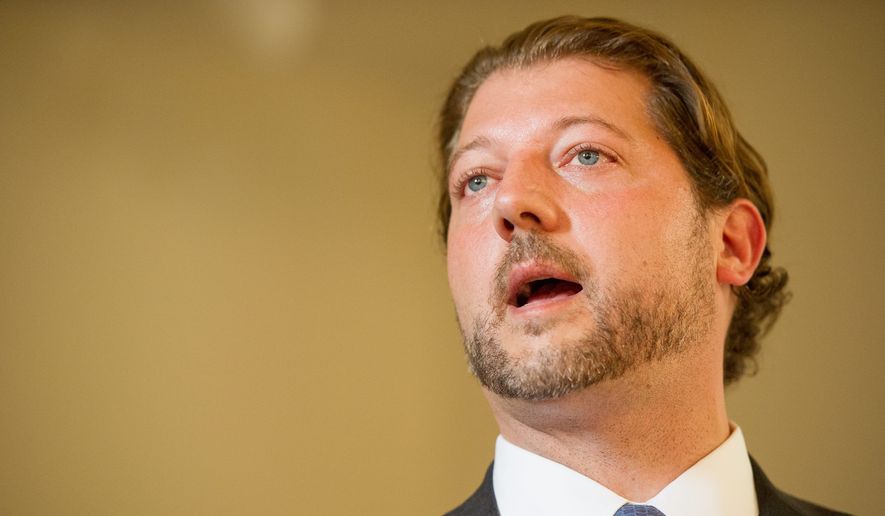A supermajority of D.C. Council members this week signed on to support a measure that would offer public financing to local candidates who forgo corporate or PAC contributions.
At-large Council member David Grosso, who crafted the bill, said the effort is meant to ensure even those without big-money backers have a shot at public office in the city, which has seen a string of scandals related to the funding of local campaigns.
Under the proposed Fair Elections Act of 2017, candidates would be eligible to receive matching payments on small campaign donations. In exchange for the public financing, participating candidates would no longer be able to accept direct corporate contributions or traditional political action committee contributions.
The contribution limits would be tiered depending on the office being sought, ranging from a limit of $20 for State Board of Education candidates to $200 for mayoral candidates. Candidates would receive a 2-to-1 match before qualifying for the ballot, then a 5-to-1 match after qualification.
“Public financing of campaigns would give greater voice to all voters and reduce the disproportionate influence of big donors in D.C. politics,” Mr. Grosso said Wednesday.
Chairman Phil Mendelson and fellow Democratic council colleagues Charles Allen (Ward 6), Robert White (at-large), Mary Cheh (Ward 3), Kenyan McDuffie (Ward 5), Trayon White (Ward 8), Brianne Nadeau (Ward 1) and Anita Bonds (at-large) all offered support for the bill as did at-large independent Elissa Silverman.
Absent from the list was former Mayor and current Ward 7 Council representative Vincent Gray, whose 2010 mayoral campaign was caught up in a long legal battle over its finances. Mr. Gray was never charged but 12 people pleaded guilty to charges stemming from the investigation, which uncovered evidence of more than $3.3 million in illegal contributions to various campaigns between 2006 and 2011.
Mr. Allen, who chairs the committee that oversees campaign finance in the city, said the bill gives more power to residents.
“Changing the way we fund campaigns in a way that prioritizes the low-dollar donor means candidates can spend more time focused on their constituents and neighbors, rather than chasing big-dollar donors,” he said.
A spokesman for Mayor Muriel Bowser said her staff is reviewing the bill, but would not comment on whether the mayor was in favor of public financing for campaigns in general.
Currently, 13 states provide some form of public financing option for gubernatorial and state house campaigns, according to the National Conference of State Legislatures. Though each of those states deal with public financing differently, they all have one provision in common: limits on how much a candidate spends on the election and how much can be accepted in donations from any one group or individual.
The D.C. Fair Elections Coalition, which is made up of about 70 progressive policy organizations and good government groups, lauded the Grosso measure introduced this week.
“It is a welcome step that legislation reintroduced today would limit the influence of big money and special interests in District elections while amplifying the voices of everyday residents, the coalition said in a statement.
The legislation would allow council members to dedicate more time to needs of residents and “less time catering to the wealthy donors and contractors who currently dominate D.C. elections.”
Aquene Freechild of the progressive advocacy group Public Citizen said small-donor public financing has worked in New York City and that the District would benefit from similar legislation.
Though normally a group with a national focus, Public Citizen has taken a particular interest in the city’s campaign finance regulations this year. Earlier this month, the organization charged that Miss Bowser’s 2014 campaign received nearly two dozen illegal donations.
Public Citizen filed a complaint with the District’s Office of Campaign Finance, asking the agency to investigate 23 contributions to the Bowser campaign “that appear to violate the campaign contribution limit.”
Public Citizen said it found that 40 percent of the donors of the excess contributions are affiliated with the real estate industry. And 68 percent of the donors are in the real estate, construction and health industries.
Ben Soto, who was the campaign treasurer for Miss Bowser’s 2014 run and went on to chair the Bowser-aligned FreshPAC, dismissed the claims, saying he was “not aware of any excess contributions and never intended to accept any excess contributions.”
The city’s Office of Campaign Finance is still reviewing the charges levied by Public Citizen.
• Ryan M. McDermott can be reached at rmcdermott@washingtontimes.com.




Please read our comment policy before commenting.